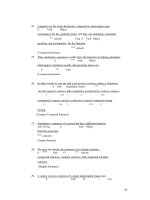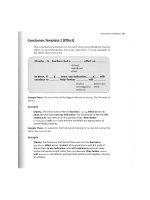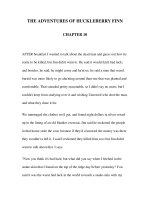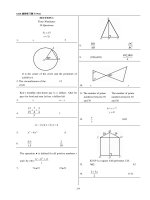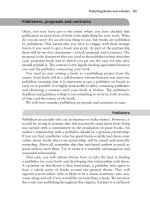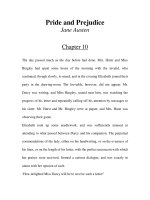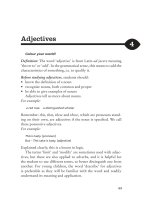Paragraphin corres 10 docx
Bạn đang xem bản rút gọn của tài liệu. Xem và tải ngay bản đầy đủ của tài liệu tại đây (176.45 KB, 9 trang )
Appendix A
Literary Terms
Here are a few of the most widely used literary devices. You will
probably be familiar with them in practice but perhaps cannot
always put a name to them.
alliteration the repetition of sounds at the beginning of words
and syllables.
" Around the rugged rocks the ragged rascals ran.
climax " I came; I saw; I conquered!
epigram a short pithy saying.
" Truth is never pure, and rarely simple. (Oscar Wilde)
euphemism an indirect way of referring to distressing or
unpalatable facts.
" I’ve lost both my parents. (= they’ve died)
" She’s rather light-fingered. (= she’s a thief)
hyperbole exaggeration.
" Jack cut his knee rather badly and lost gallons of blood.
" What’s for lunch? I’m starving.
" I loved Ophelia. Forty thousand brothers
Could not, with all their quantity of love,
Make up my sum. (Shakespeare: ‘Hamlet’)
irony saying one thing while clearly meaning the opposite.
" For Brutus is an honourable man. (Shakespeare: ‘Julius
Caesar’)
litotes understatement.
" He was not exactly polite.(=veryrude)
" Iamacitizenofno mean city.(=StPaulboastingabout
Tarsus and hence about himself)
metaphor a compressed comparison.
" Anna flew downstairs. (i.e. her speed resembled the speed of
abirdinflight)
" Sleep that knits up the ravelled sleeve of care. (Shakespeare:
‘Macbeth’)
187
" No man is an island, entire of itself. (John Donne)
metonymy the substitution of something closely associated.
" The bottle has been his downfall. (= alcohol)
" The kettle’s boiling. (= the water in the kettle)
" The pen is mightier than the sword.
onomatopoeia echoing the sound.
" Bees buzz;sausagessizzle in the pan; ice-cubes tinkle in the
glass.
Frequently, alliteration, vowel sounds and selected consonants
come together to evoke the sounds being described:
" Only the monstrous anger of the guns
Only the stuttering rifles’ rapid rattle
Can patter out their hasty orisons.
(Wilfred Owen: ‘Anthem for Doomed Youth’)
oxymoron apparently contradictory terms which make sense at a
deeper level.
" The cruel mercy of the executioner bought him peace at last.
paradox a deliberately contradictory statement on the surface
which challenges you to discover the underlying truth.
" If a thing is worth doing, it’s worth doing badly. (G. K.
Chesterton)
personification describing abstract concepts and inanimate objects
as though they were people.
" Death lays his icy hand on kings. (James Shirley)
Often human feelings are also attributed. This extension of
personification is called the pathetic fallacy.
" The wind sobbed and shrieked in impotent rage.
pun a play on words by calling upon two meanings at once.
" Is life worth living? It depends on the liver.
rhetorical question no answer needed!
" Do you want to fail your exam?
simile a comparison introduced by ‘like’, ‘as’, ‘as if’ or ‘as though’.
" O, my Luve’s like a red red rose
That’s newly sprung in June. (Robert Burns)
" Iwanderedlonelyas a cloud. (William Wordsworth)
188
APPENDIX A LITERARY TERMS
" You look as if you’ve seen a ghost.
synecdoche referring to the whole when only a part is meant, or
vice versa.
" England has lost the Davis Cup. (= one person)
" All hands on deck!
transferred epithet the adjective is moved from the person it
describes to an object.
" She sent an apologetic letter.
" He tossed all night on a sleepless pillow.
zeugma grammatical play on two applications of a word.
" She swallowed her pride and three dry sherries.
" Shewentstraighthomein a flood of tears and a sedan chair.
(Charles Dickens: ‘The Pickwick Papers’)
APPENDIX A LITERARY TERMS
189
This page intentionally left blank
Appendix B
Parts of Speech
Each part of speech has a separate function.
Verbs are ‘being’ and ‘doing’ words.
It seems.
She is laughing.
All the pupils have tried hard.
Note also these three verb forms: the infinitive (to seem); the
present participle (trying); the past participle (spoken).
Adverbs mainly describe verbs.
He spoke masterfully.(=how)
She often cries. (= when)
My grandparents live here.(=where)
Nouns are names (of objects, people, places, emotions, collections,
and so on).
common noun: table
proper noun: Emma
abstract noun: friendship
collective noun: swarm
Pronouns take the place of nouns.
He loves me. This is mine. Who cares? I do.
Adjectives describe nouns and pronouns.
a hard exercise a noisy class red wine
Conjunctions are joining words.
co-ordinating: fish and chips; naughty but nice; now or never
subordinating: We trusted him because he was honest.
She’ll accept if you ask her.
Everyone knows that you are doing your best.
Prepositions show how nouns and pronouns relate to the rest of
the sentence.
Put it in the box. Phone me on Thursday. Give it to me. Wait by
the war memorial. He’s the boss of Tesco.
Interjections are short exclamations.
Hi! Ouch! Hurray! Ugh! Oh! Shh! Hear, hear!
The articles:definite(the)
indefinite (a; an –singular;some –plural)
191
This page intentionally left blank
Appendix C
Planning, Drafting and Proofreading
PLANNING
Whenever you have an important essay, letter, report or article to
write, it’s well worth taking time to work out in advance exactly
what you want to say. Consider also the response you hope to get
from those who read the finished document and decide on the tone
and style which would be most appropriate.
" Next, jot down, as they come into your head, all the points
that you want to include. Don’t try to sort them into any
order. Brainstorm. (It’s better to have too much material at
this stage than too little.)
" Then, read through these jottings critically, rejecting any that
no longer seem relevant or helpful.
" Group related points together. These will form the basis of
future paragraphs.
" Sequence these groups of points into a logical and persuasive
order.
" Decide on an effective introduction and conclusion.
DRAFTING
Now you are ready to write the first draft.
" Concentrate on conveying clearly all that you want to say,
guided by the structure of your plan.
" Choose your words with care. Aim at the right level of
formality or informality.
" Put to one side any doubts about spelling, punctuation,
grammar or usage. These can be checked later. (If you wish,
you can pencil queries in the margin, or key in a run of
question marks – ?????.)
" When you have finished this first draft, read it critically,
concentrating initially on content. (It can help to read aloud.)
Have you included everything? Is your meaning always clear?
Should some points be expanded? Should some be omitted?
Have you repeated yourself unnecessarily?
193
TEAMFLY
Team-Fly
®
" Read the amended text again, this time checking that you
have maintained the appropriate tone. Make any adjustments
that may be needed.
" Examine the paragraphing. Does each paragraph deal
adequately with each topic? Should any paragraphs be
expanded? Should any be divided? Should the order be
changed? Does each paragraph link easily with the next? Are
you happy with the opening and closing paragraphs?
(Sometimes they work better when they are reversed.) Should
any paragraphs be jettisoned?
" Are you happy with the layout and the presentation?
" If you have made a lot of alterations, you may wish to make
a neat copy at this stage. Read through again, critically,
making any adjustments that you feel necessary. You may find
third and fourth drafts are needed if you are working on a
really important document. Don’t begrudge the time and
effort. Much may depend on the outcome.
PROOFREADING
When you are happy with the content, style and tone, you are ready
to proofread. Proofreading means scrutinising the text for spelling,
punctuation, grammar, usage and typographical errors.
" Make yourself read very slowly. Best of all, read aloud. Read
sentence by sentence, paragraph by paragraph. Read what is
actually there, not what you meant to write.
" Check anything that seems doubtful. Check all the queries you
tentatively raised earlier. Don’t skimp this vital penultimate
stage. Don’t rely wholly on a computer spellcheck; it will
take you only so far (and, in some cases, introduce errors of
its own).
" If you know you have a particular weakness (spelling,
perhaps, or not marking sentence boundaries – commas are
not substitutes for full stops!), then devote one read-through
exclusively to this special area.
" When you are satisfied that you have made this important
document as good as you possibly can, you are ready to make
the final neat version. If, in the process, you make any small
errors, don’t simply cross them out and don’t use correction
fluid. Rewrite. When the last word is written, you can be
194
APPENDIX C PLANNING, DRAFTING AND PROOFREADING
satisfied that you have done your very best. Good luck!
Note: If you have a form to fill in, it is well worth making a few
photocopies before you start. Practise what you want to say on the
photocopies. Fit what you want to say carefully in the space
available. Then complete the original form. It’s well worth the extra
time taken.
APPENDIX C PLANNING, DRAFTING AND PROOFREADING
195

